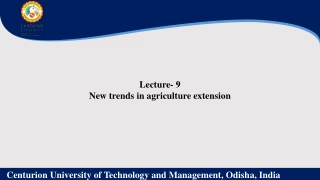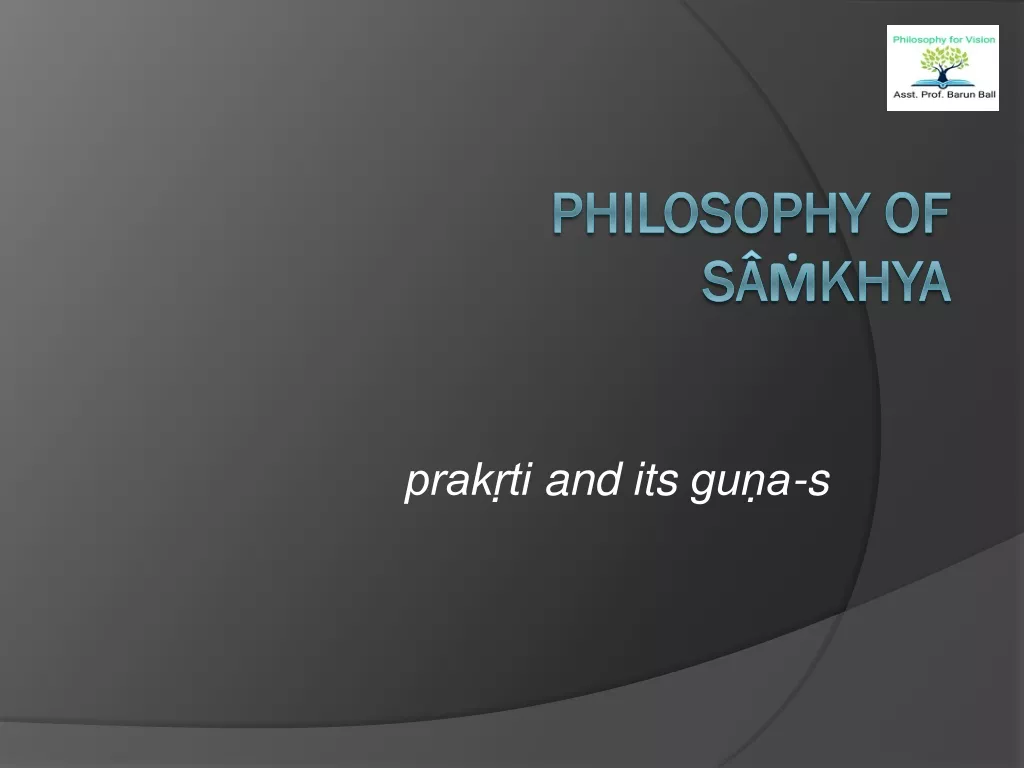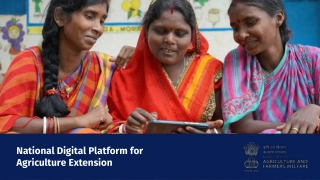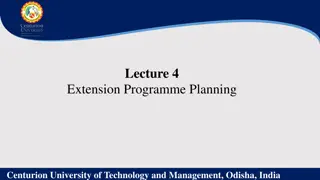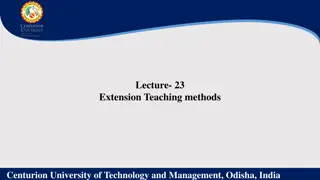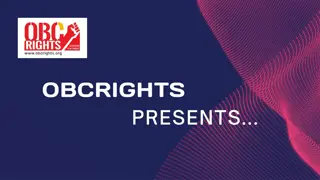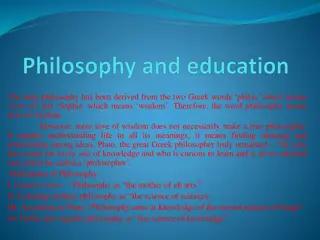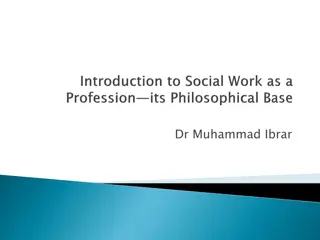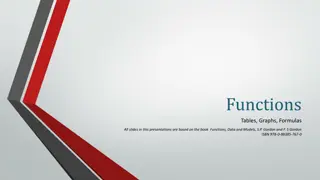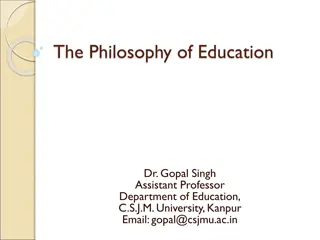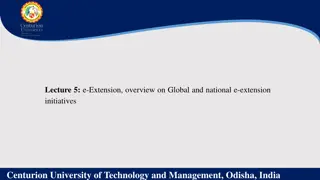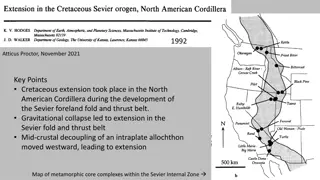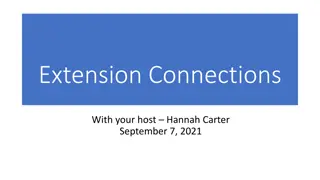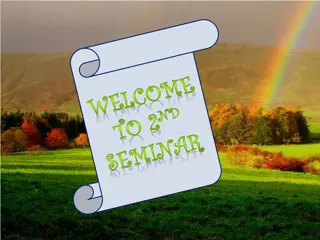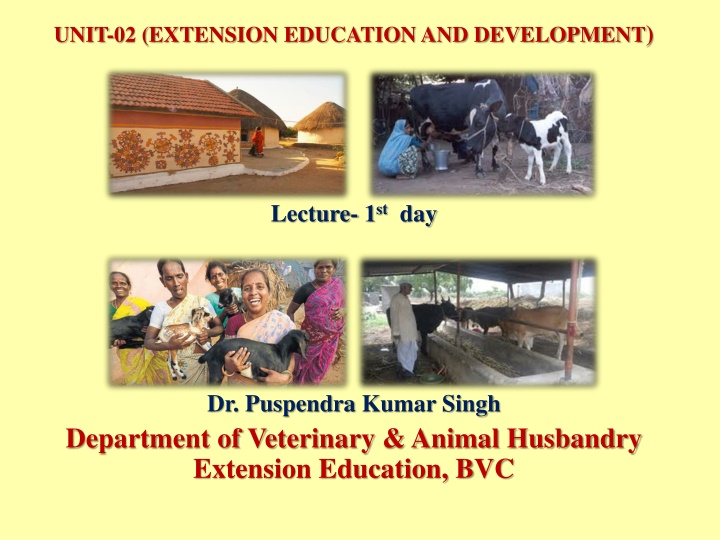
Extension Education and Development: Concepts and Practices
Explore the fundamental concepts of extension education, including its philosophy, functions, and objectives. Discover the meaning of extension and education, as well as their roles in bringing about desirable changes in human behavior. Delve into the application of extension education in improving practices in farm production, conservation, and marketing. Understand how communication and knowledge dissemination play pivotal roles in extension education, aiming to empower individuals to make informed decisions within their specific contexts.
Uploaded on | 3 Views
Download Presentation

Please find below an Image/Link to download the presentation.
The content on the website is provided AS IS for your information and personal use only. It may not be sold, licensed, or shared on other websites without obtaining consent from the author. If you encounter any issues during the download, it is possible that the publisher has removed the file from their server.
You are allowed to download the files provided on this website for personal or commercial use, subject to the condition that they are used lawfully. All files are the property of their respective owners.
The content on the website is provided AS IS for your information and personal use only. It may not be sold, licensed, or shared on other websites without obtaining consent from the author.
E N D
Presentation Transcript
UNIT-02 (EXTENSION EDUCATION AND DEVELOPMENT) Lecture- 1stday Dr. Puspendra Kumar Singh Department of Veterinary & Animal Husbandry Extension Education, BVC
Extension Education and Development 3rdYear, VAHEE
Topics covered Extension education: Concept, levels, objectives dimensions. Philosophy functions of education. and and extension
Meaning of EXTENSION Latin roots ex & tensio Out of school education
Meaning of EDUCATION Process of changes into the behavior of human Informal, Formal & Non-formal bringing desirable
EXTENSION EDUCATION Extension as an out of school education and services for the members of the farm family and others directly or indirectly engaged in farm production, to enable them to adopt improved practices in production, conservation and marketing (National Commission on Agri. 1976) management,
EXTENSION EDUCATION an educational knowledge to the improved practices in a convincing manner and to help them to take decisions within their specific local conditions (Dahama) as process rural to provide about people
EXTENSION EDUCATION involves communication people to form sound opinions and make good decisions (van den Ban & Hawkins - 1996) the conscious information use to of of help
EXTENSION EDUCATION is a science which deals with the creation, transmission & application of knowledge designed to bring about planned changes in the behaviour complex of people, with a view to help them live better by learning the ways of improving enterprises & institutions. (Leagan) their vocations,
V. & A. H. EXTENSION EDUCATION is a special branch of extension education which deals with the people procedures, in improving methods & techniques, increasing the animals & birds production, efficiency & income, stepping up the level of living & elevating the social & educational standards of rural life. (P. Mathiyalagan) through livestock educational farming
These definitions indicate that Extension is for - Extending educational advantages Forming sound opinions to make good decisions Inducing changes in voluntary behavior
Formal education Extension education Confined teaching Outside the four walls Homogeneous learner with common goals Heterogeneous learner with diverse goals Strict norms & no free choice to learners Choice of subject matter left to the learners Fixed curriculum, exam, awarded degrees Flexible, need based Class attendance is compulsory Participation is voluntary Knowledge flows from teachers to learners Extension agent may learn from learner Teaching is only through instructors Also through local leaders Starts with practical and develops into theoretical understanding Starts with theory & works up-to practical More practical & intended for immediate application More theoretical Pre-planned & pre-decided Based on expressed desires, need
NEED OF EXTENSION Research Farmers Extension
Objectives of Extension Education To bring desirable changes in the knowledge, attitude, skill, action etc. To assist people to realize their needs & problems To develop rural leadership, mobilizing people & their resources To provide research information of economic and practical importance To collect and transmit feedback information for solving management problems
Ultimate aim of extension RAISE STANDARD OF LIVING of livestock owners Aim of extension INCREASE PRODUCTION of animals thereby income through application of scientific knowledge EDUCATION OF LIVESTOCK OWNERS & other stakeholders Means LIVESTOCK OWNERS RESOURCES (labour, livestock, land, capital etc) with minimum govt. assistance Resources
Philosophy of Extension Education (Ensminger) Education for all people Changing knowledge, skill & attitude Working with men & women & all, to answer needs & wants Helping people to help themselves Learning by doing & seeing is believing Teaching what to want & ways of satisfying it & inspiring to achieve desires. Development of individuals, their leaders, society & world Working together to expand welfare & happiness Working together in harmony with the culture Living relationship, respect & trust for each other, share joys & sorrows Extension is a two way channel A continuous educational process
Philosophy of Extension Education According to Kelsey & Hearne (1967) To teach how to think, not what to think. Extension specific job is furnishing the inspiration, supplying specific advice and technical help, and counseling to see that the people as individuals, families, groups and communities work together as a unit in blue printing their own problems, charting their own courses, & launch forth to achieve objectives. According to Bhatnagar and Desai (1987) Educational, persuasive and never-ending process that generates harmony, leadership, effective communication, participation and involvement of the people in organizing self-help activities and projects. System of learning by doing & seeing is believing , mutual learning co-operative, collaborative, democratic,
Philosophy of Extension Education (Mildred Horton) The individual is supreme in a democracy The home is the fundamental unit in a civilization The family is the first training group of the human race The foundation of any permanent civilization must rest on the partnership of man and land
Functions of extension education- Change in Knowledge Attitude Skills Action Understanding Goal Confidence
NEED FOR STUDYING EXTENSION To be a successful extension worker he should not only know what to teach, but also how to teach people Should know the nature of the people with whom he lives and works

